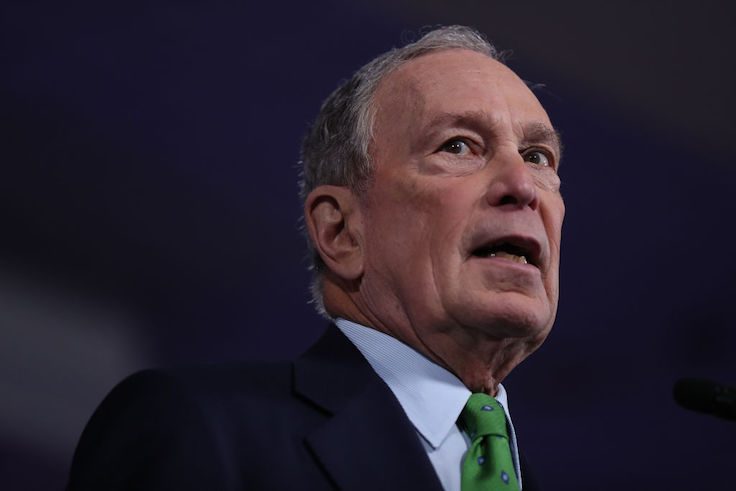Michael Bloomberg was unfazed by news of Princess Diana's tragic death, telling a friend in the immediate aftermath of her 1997 passing that it was "just one life" and the world would go on just the same.
Bloomberg's remarks, reported by the Washington Free Beacon for the first time, came during a 1999 interview with his alma mater, Johns Hopkins University. Recalling his comments to a grieving friend who told him "life will never be the same again," Bloomberg remarked, "Well, never the same again for Princess Diana, but everyone else went on."
The former New York City mayor and current Democratic presidential candidate also recalled his reaction to the 1963 assassination of President John F. Kennedy. Both tragedies triggered widespread mourning, but not from Bloomberg, who considered the media coverage and emotional outpouring overblown and the events themselves relatively inconsequential. The Kennedy assassination has proven to be one of the most memorable events in modern history, with 95 percent of adults remembering exactly where they were when they heard the news, according to the Pew Research Center.
"It was like Princess Diana, in that everybody thought the world had changed, and the papers were full of it," Bloomberg said of the Kennedy assassination, "but a week later people go back to their own work, their own lives, and there was nothing changed, no matter what anybody says."
The billionaire businessman made the remarks in the course of an interview for an oral history project conducted by the historian Mame Warren. During the course of the 30-minute interview, Bloomberg recalled that his life on campus went on uninterrupted after Kennedy was shot on November 22, 1963—aside from the fact that his fraternity, Phi Kappa Psi, wasn't getting back a deposit it put down for an appearance by singer James Brown.
"I remember in November I had planned a big fraternity dance in the gym, and we had spent all our budget hiring James Brown and the Flames to play, and then Kennedy got shot and we canceled the dance and couldn't get our deposit back," Bloomberg said. "Never got the deposit back."
Kennedy, he added, "was not popular," and is remembered positively today only because he was assassinated. "There were stories that he wouldn't even get the Democratic nomination, much less get reelected," Bloomberg said. "How quickly we forget."
Bloomberg recalled that he was in the Hamptons the day Princess Diana died when a friend called him to the television to watch the news unfold and told him, "Nothing will ever be the same again, Princess Diana has died in a crash."
"You know, it's just one life," Bloomberg recalled saying. "There's a lot of people that died today."
"No, I didn't understand the world was never going to be the same again," Bloomberg said. "Well, never the same again for Princess Diana, but everybody else went on, thank you."
Bloomberg was candid in the interview, even remarking in an off-the-record aside that he was fighting a student-led push to boost the university's minimum wage to $7.90. Bloomberg, at the time on the university's board of trustees, had long opposed minimum wage laws, calling them "misguided" policy that hurts the poor by killing jobs. He now endorses raising the federal minimum wage to $15 an hour.
The Bloomberg campaign declined to comment on the 1999 interview.
Bloomberg reportedly maintained his callous perspective on death into his successful business career, adopting "get over it" as his default advice for those facing tragedy. He has, however, struck a more empathetic tone as a presidential candidate.
In response to the Sunday helicopter crash that killed NBA star Kobe Bryant and eight others, Bloomberg joined the majority of his Democratic opponents, as well as President Donald Trump, and immediately offered his condolences.
"We are watching the news out of California with heavy hearts and thinking of the Bryants and all the families who are devastated by this terrible tragedy," Bloomberg said in a social media post hours after the crash.
Bloomberg's controversial remarks have raised eyebrows since his first run for office in 2001, when a pamphlet of Bloomberg one-liners compiled as a gag gift by colleagues was obtained by New York magazine. A separate set of remarks about women's appearances have surfaced through lawsuits from women who worked for Bloomberg and allege that his company, in its early days, resembled a frat house.
That side of Bloomberg is reflected in the 1999 interview, in which the businessman talked at length about the importance of appearances.
"Unfortunately, in the world we live in, physical looks do have something to do with people's perception of you, and you'd be better off if they perceived you in a more favorable light before you opened your mouth as opposed to coming around to understand you after you talk for a while," Bloomberg said. "It's just more efficient."
"Unfortunately, we're human beings and we all judge people by their clothing, by their looks, by their accents."
His current campaign has attempted to distance Bloomberg from his past remarks, saying the billionaire regrets much of what has come from his mouth.
"Mike has come to see that some of what he has said is disrespectful and wrong," campaign spokesman Stu Loeser told the New York Times last November. "He believes his words have not always aligned with his values and the way he has led his life."
